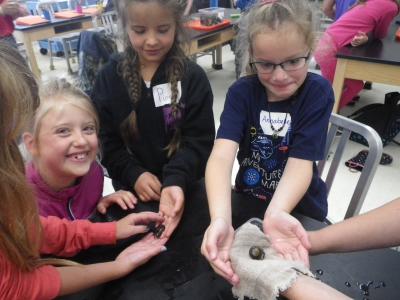- About Us
- Exhibits
- Exploring Our Coast
- Marine Education
- Volunteer
- Our People
- Make a Gift
Incorporate an interactive program into your next coast trip! We offer a variety of one- and two-hour classes for schools and other educational groups. Topics include marine technology, animal adaptations, field sampling, data collection and more. We host school groups March - June, schedule your Spring trip today!
Registration is now open for in-person lab and field experiences for Late Winter and Spring 2024! Please be sure to review information listed below - we look forward to hosting your group soon.
Groups may also add Visitor Center exploration to their trip. Labor Day through Memorial Day, our Visitor Center is open Thursday through Monday (closed Tuesday and Wednesday), 10 am to 4 pm. All groups and/or other groups larger than 15 are required to purchase tickets in advance. Groups larger than 30 may be asked to split their time between visitor center exploration and alternative activities to ensure equitable access to our exhibits.
Consider doing a Quest while at Hatfield! We recommend two self-guided Quests that begin at HMSC; review the directions:
Also, read "Tips for Questing with School Groups" (pdf) to help you plan your adventure.
Time: 1 hour
Description: Students will learn about a variety of marine organisms and their needs for survival as they create miniature ocean habitats complete with algae, snails, crabs, barnacles, food and shelter.
Pre-visit materials: (pdf) (accessible HTML)
Special notes: Live animal interactions
Grades: Pre-K - 2nd
Time: 1 hour
Description: Through hands-on exploration, students discover the sticky parts of live sea anemones, sea urchins and other marine organisms. Find out what causes the stickiness, and learn how being adhesive helps animals defend themselves, capture food or maintain their position in tide pools.
Pre-visit materials: none
Special notes: Live animal interactions
Grades: 3rd - adult
Time: 1 hour
Description: Observe a variety of marine animals from sandy beaches, estuaries and rocky shores. Investigate the adaptations they have for surviving in these marine environments.
Pre-visit materials: (pdf) (accessible HTML)
Special notes: Live animal interactions
Grades: 3rd - adult
Time: 1 hour
Description: Students participate in live crab races, form hypotheses, and design experiments to test them. What variables determine which crabs are faster? Is it size, species, sex, or number of appendages? Join us as we investigate in this engaging program!
Pre-visit materials: (pdf) (accessible HTML)
Special notes: Live animal interactions
Grades: 4th - adult
Time: 1 hour
Description: Investigate the external and internal anatomy of squid while studying how these invertebrates are adapted for life in the sea. Students will also learn how to use dissection tools and proper dissection techniques
Pre-visit materials: (pdf) (accessible HTML)
Special notes: none
Grades: 5th - adult
Time: 1 hour
Description: Learn about the external and internal anatomy of bony fish species while gaining an understanding of the purpose of various organs. Discover how data is collected by researchers and used to manage fish populations.
Pre-visit materials: none
Special notes: none
Grades: 5th - adult
Time: 1 hour
Description: Discover the rocky intertidal habitat and the diverse creatures that live there, all in the lab. Learn about the environmental forces that make this ever-changing habitat a challenging place to live, while investigating the relationships among living things and the interactions between them.
Pre-visit materials: (pdf) (accessible HTML)
Special notes: Live animal interactions
Grades: 5th - adult (Temporarily Not Available)
Time: 1 hour
Description: Work together as a class to assemble the skeleton of a 16-foot-long Cuvier’s beaked whale. Students will also learn about the differences and similarities of toothed and baleen whales using real whale teeth, baleen and other biofacts.
Pre-visit materials: none
Special notes: none
Grades: 6th - adult
Time: 2 hours
Description: In this hands-on program, students are introduced to Remotely Operated Vehicles (ROVs) and challenged to work in teams to design mini-ROVs that will be used to complete a mission. This engaging class meets engineering design science standards while promoting teamwork and critical thinking skills. This program is partially outdoors - rain gear recommended!
Pre-visit materials: (pdf) (accessible HTML)
Special notes: none
Grades: all ages
Time: 1 hour
Description: Discover estuaries and the critical habitat they provide as we explore plant and animal life along the Yaquina Bay. Collect and observe a variety of organisms found in the unique environment of mudflats and learn about their adaptations.
Pre-visit materials: (pdf) (accessible HTML)
Special notes: Live animal interactions; boots and rain gear highly recommended - no flip flops; low tide required for this class. Consult 2022 tide tables (pdf) for dates and times.
Grades: 5th - adult
Time: 1 hour
Description: Use plankton nets to collect samples from the Yaquina Bay, then identify plankton using microscopes in this combination field and lab program. Students will learn about the importance of plankton to the survival of all marine organisms and observe filter feeders consuming plankton in this hands-on program. Boots are required for this program, as students need to wade into the estuary to collect plankton samples.
Pre-visit materials: (pdf) (accessible HTML)
Special notes: Live animal interactions; boots and rain gear highly recommended - no flip flops.
Grades: 6th - adult
Time: 2 hour
Description: Discover estuaries and the critical habitat they provide as we explore plant and animal life along the Yaquina Bay. Collect and observe a variety of organisms found in the unique environment of mudflats, and learn about their adaptations. Examine collected specimens further in our wet lab. Learn about current research being conducted and help collect data for use by researchers.
Pre-visit materials: none
Special notes: Live animal interactions; boots and rain gear highly recommended - no flip flops; low tide required for this class. Consult 2022 tide tables (pdf) for dates and times.
